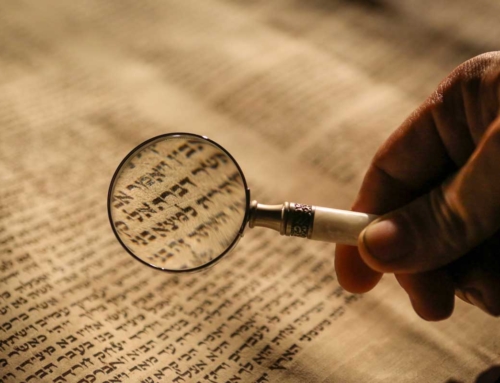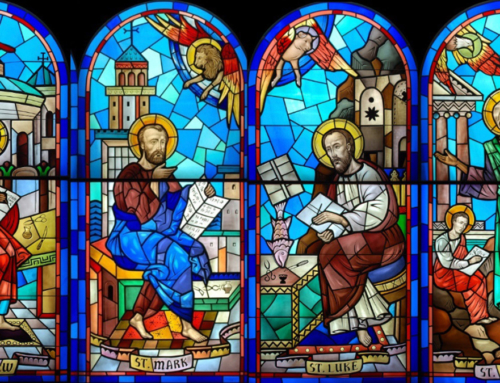ONE RACE IN THE IMAGE OF GOD
As Christians, we believe that humankind started with a single pair of humans (Genesis 2-3; Acts 17:26). We believe that Adam and Eve were real historical individuals. We know that God made them in his image and charged them with reflecting his glory by ruling over the world and living in loving relationships (Genesis 1:26-28). We know that they failed to rule rightly and retain good relations with God and one another (Genesis 2). We know that when Adam sinned, all of his descendants became guilty in him and inherited a sinful nature from him (Romans 5:12-21). We also know that we live in a world that is under God’s curse because of Adam’s sin (Romans 8:20-22). We know that in the Garden of Eden God promised that a Deliverer would be born of a woman (Genesis 3:15). We believe that Jesus is that Deliver and that he is the Last Adam who has come to rescue God’s people and set all things right (Romans 5:12-21; 1 Corinthians 15:21-22; 45-49).
All of us – whether we are tall and broad or short and thin, from the darkest to the lightest skin tones, from the straight-haired to the tightly-curled-haired – are descended from that one couple. To be sure, the physical differences among us are not a product of the Fall, but a part of God’s design and purpose for his image-bearers. He designed us for diversity and for himself.
The God who made the world and everything in it, being Lord of heaven and earth, does not live in temples made by man, nor is he served by human hands, as though he needed anything, since he himself gives to all mankind life and breath and everything. And he made from one man every nation of mankind to live on all the face of the earth, having determined allotted periods and the boundaries of their dwelling place, that they should seek God, and perhaps feel their way toward him and find him. (Acts 17:24–27)
This means that, in reality, there aren’t different races of human beings. We are all one race: the human race.
WHAT IS RACISM?
Given this “one human race” reality, we might be tempted to throw away the term “racism” and replace it with “ethnocentrism.” Unfortunately, language doesn’t always bend to our wishes, and it’s more beneficial for us to use common terminology. Therefore, when I use the term “racism” I mean something like “ethnocentrism.” In that vein, I understand racism to be the belief (conscious or unconscious) that one “race” (ethnic group) is superior to another race.
Since all people are descendants of Adam and Eve and made in his image, and since the ethnic and cultural diversity we see around us is a part of God’s good design, racism is sinful. Racism rejects, explicitly or implicitly, our shared origin and the goodness of our diversity. Racism elevates, without biblical justification, one person or group of people over another. Racism is, therefore, a failure to love our neighbor as ourselves (Leviticus 19:18; Matthew 22:39). It is an assault upon the image of God in our fellow man. If you know nothing else about racism, you need to know this much.
WHAT IS SYSTEMIC RACISM?
A racist act is anything we do that is caused by or rooted in a racist belief. Because this belief can be an unconscious conviction, we may actually commit racist acts without ever knowing it. We may treat people unfairly or respond to them negatively without realizing what we are doing or without recognizing our true motives. Knowing this reality should impact our assessment of systemic racism.
Systemic racism, sometimes called institutional racism, is the sin of racism woven through a system, institution, or community. For many of us, this is new terminology. Therefore, we have to ask, is systemic racism real? Is it a biblical concept? We must begin to answer this question by addressing the larger category of sin, of which racism is one expression among many. Sin is a failure to honor and glorify God as we ought. Sin is rebellion against our Creator. We are all sinners; we have all inherited a sinful nature from Adam; we have all fallen short of giving God the glory he deserves.
If all human beings are fallen and sinful, and if all of our institutions and communities are made up of human beings, then we shouldn’t be surprised to find that these institutions and communities are infused with the sinful thought patterns of the people within them. (To be sure, God’s common grace often evidences itself in the good that many such imperfect systems or institutions bring about – See Romans 13:3-4). Of course, “systemic racism” is often used in ways that do not align with a biblical worldview. We may perhaps be better served by a term like corporate sin or corporate racism, but we don’t always get to choose our terminology. We can, at least in the sense of the corporate expression of sin in human institutions, affirm the reality of systemic racism (though we must reject unbiblical definitions and applications of the idea).
Sometimes, we can see systemic racism in overt ways. Laws or rules may be put in place that reward one people group or disadvantage another. We may think of the African slave trade or Jim Crow laws in the southern states or the anti-Jewish laws of Nazi Germany. These are visible. We should look for any visible manifestations of systemic racism and root them out. We might call these forms of systemic racism de jure, in that they are “of the law.” They are enshrined in actual laws and regulations.
Many forms of systemic racism will not be enshrined in any law or legislated by the government. We might call these forms of systemic racism de facto, because even though no law mandates a certain racist practice, the facts on the ground show a widespread racist bent in a particular institution or practice. Like individual acts of racism, systemic racism often takes the form of unconscious beliefs about others. Thus, the unseen decisions of the many members of an institution or community may have the net effect of spreading racism throughout the institution or community in such a way that no overt laws or rules may enforce racist beliefs; yet at the same time a clear system-wide, sinful bent places particular people groups at a sharp disadvantage and makes them subject to mistreatment because of their ethnic identity. These are harder to see, easier to misdiagnose, and more prone to misunderstanding. They are also more prevalent than overt systemic racism, at least in our current cultural moment in the West.
To be sure, we should view overt acts of racism (both individual and systemic) differently than these unintended, unconscious racist acts and attitudes. If we paint with too broad a brush in our attempts at justice, we will end up enforcing another kind of injustice: disproportionate blame or punishment. Justice demands a different form and level of punishment for the slave holder than for the company whose human resources department more readily rejects black applicants because of unconscious assumptions about these applicants based upon their ethnic identity. Just as we should seek to root all overt, de jure forms of systemic racism, so we should also examine our own hearts and practices as well as those of our communities for de facto forms of systemic racism.
THE ULTIMATE SOLUTION
Even with these necessary efforts, in this world, we will never eliminate all racism and will never be rid of injustice. We will never have a society of sinful people without sin – even the sin of racism. But there is hope. In the Cross, Christ paid the penalty for our sins. He died for racists and took the penalty for racist attitudes and acts. Christ has reconciled those who trust in him to the God from whom our sin alienates us: “Therefore, we are ambassadors for Christ, God making his appeal through us. We implore you on behalf of Christ, be reconciled to God. For our sake he made him to be sin who knew no sin, so that in him we might become the righteousness of God,”(2 Corinthians 5:20–21). God declares the guilty innocent and the unrighteous to be righteous when we put our faith in his Son. There is no other way to be reconciled to our Creator. All are either currently alienated from him or have been reconciled to him by the blood of Christ.
Christian conviction views people primarily in terms of their relationship to Christ. You are either “in Christ” or you are outside of Christ. You are saved or lost. You are on the narrow path that leads to life or the broad path that leads to destruction. Our primary problem is that we are alienated from God. We are sinners and he is the just Judge. Knowing this reality means that while we acknowledge, lament, and seek to root out racism, we cannot allow our assessment of those around us and of societies’ structures to be seen exclusively or mainly through the lens of power. We need to call out those who oppress (Ezekiel 22:29) and lift up the oppressed (James 1:27), but we also need to acknowledge that these are not the most important categories by which to measure humanity. We are, fundamentally, whether rich or poor, black or white, either in Christ or still in our sins. If we are in Christ, then we have a hope that looks beyond the injustices of this world.
Moreover, if two sinners have both been brought near to God by the blood of Christ, they have been brought near to one another by that same blood. Speaking of the vast ethnic divide between Jew and Gentile, Paul writes:
…now in Christ Jesus you who once were far off have been brought near by the blood of Christ. For he himself is our peace, who has made us both one and has broken down in his flesh the dividing wall of hostility by abolishing the law of commandments expressed in ordinances, that he might create in himself one new man in place of the two, so making peace, and might reconcile us both to God in one body through the cross, thereby killing the hostility. (Ephesians 2:13–16)
Christ has made one that which was once divided by racism and cultural distance. This is true for all Christians in all times and places. The question becomes, how do we make this spiritual oneness as real and present as we can in this world? How can we make the church on earth look most like the church in heaven, made up of people from every tribe, language, and nation (Revelation 7:9-10). The simple but profound answer is love. Those who love God must love his image-bearers. Those who love Christ must love all those who are in Christ.
Whoever says he is in the light and hates his brother is still in darkness. Whoever loves his brother abides in the light, and in him there is no cause for stumbling. But whoever hates his brother is in the darkness and walks in the darkness, and does not know where he is going, because the darkness has blinded his eyes. (1 John 2:9–11)
Our love for one another does not make us righteous in God’s eyes, but it does confirm that we have been declared righteous through faith in Christ. There is no better way to “test yourself, to see if you are in the faith,” than to examine your love for other Christians, especially those who do not look like you or share your cultural background.
Reconciliation with others rooted in our reconciliation to God is the key to successfully confronting racism in all its forms. We need to love others with the very same love with which we have been loved. John M. Perkins reminds us of this very thing:
But as I come closer to the end of my journey, I am aware that community development can only take us so far—because this is a gospel issue. The problem of reconciliation in our country and in our churches is much too big to be wrestled to the ground by plans that begin in the minds of men. This is a God-sized problem. It is one that only the Church, through the power of the Holy Spirit, can heal. It requires the quality of love that only our Savior can provide.




